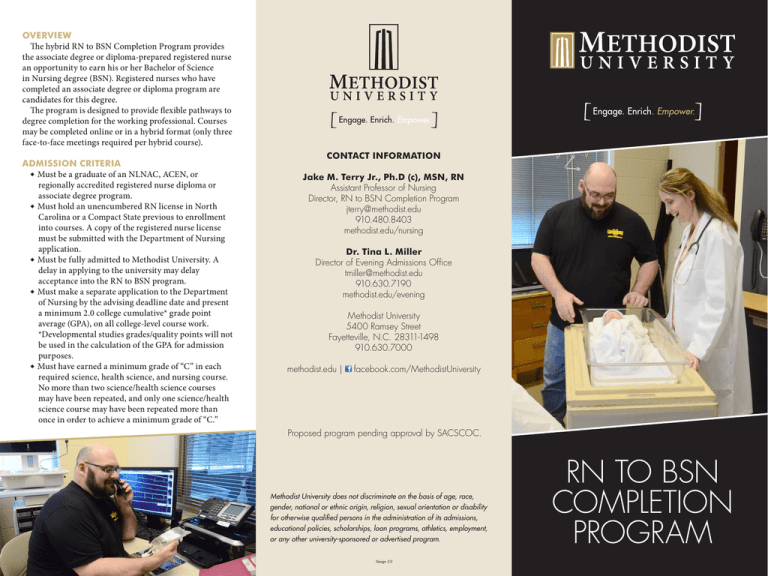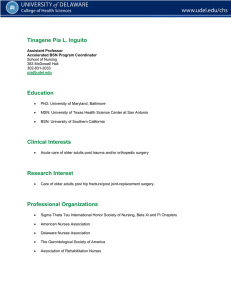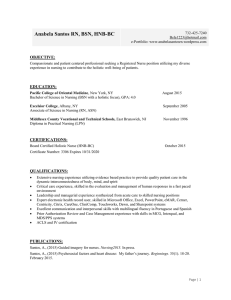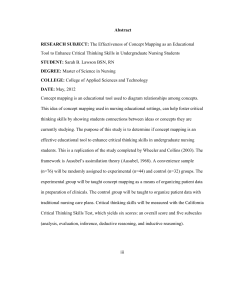The hybrid RN to BSN Completion Program provides OVERVIEW
advertisement

OVERVIEW The hybrid RN to BSN Completion Program provides the associate degree or diploma-prepared registered nurse an opportunity to earn his or her Bachelor of Science in Nursing degree (BSN). Registered nurses who have completed an associate degree or diploma program are candidates for this degree. The program is designed to provide flexible pathways to degree completion for the working professional. Courses may be completed online or in a hybrid format (only three face-to-face meetings required per hybrid course). ADMISSION CRITERIA u Must be a graduate of an NLNAC, ACEN, or regionally accredited registered nurse diploma or associate degree program. u Must hold an unencumbered RN license in North Carolina or a Compact State previous to enrollment into courses. A copy of the registered nurse license must be submitted with the Department of Nursing application. u Must be fully admitted to Methodist University. A delay in applying to the university may delay acceptance into the RN to BSN program. u Must make a separate application to the Department of Nursing by the advising deadline date and present a minimum 2.0 college cumulative* grade point average (GPA), on all college-level course work. *Developmental studies grades/quality points will not be used in the calculation of the GPA for admission purposes. u Must have earned a minimum grade of “C” in each required science, health science, and nursing course. No more than two science/health science courses may have been repeated, and only one science/health science course may have been repeated more than once in order to achieve a minimum grade of “C.” CONTACT INFORMATION Jake M. Terry Jr., Ph.D (c), MSN, RN Assistant Professor of Nursing Director, RN to BSN Completion Program jterry@methodist.edu 910.480.8403 methodist.edu/nursing Dr. Tina L. Miller Director of Evening Admissions Office tmiller@methodist.edu 910.630.7190 methodist.edu/evening Methodist University 5400 Ramsey Street Fayetteville, N.C. 28311-1498 910.630.7000 methodist.edu | facebook.com/MethodistUniversity Proposed program pending approval by SACSCOC. Methodist University does not discriminate on the basis of age, race, gender, national or ethnic origin, religion, sexual orientation or disability for otherwise qualified persons in the administration of its admissions, educational policies, scholarships, loan programs, athletics, employment, or any other university-sponsored or advertised program. Design 2.0 RN TO BSN COMPLETION PROGRAM WHY CHOOSE MU NURSING? u We have outstanding nursing faculty who are proven nurse educators. u We offer hybrid classes, which allow the working professional more flexibility with course schedules. u We embrace students as part of a learning community. u We offer a broad foundation in the sciences and a liberal arts core. u We are fully accredited by the CCNE. WHY SHOULD I GO BACK TO SCHOOL TO EARN MY BSN? The American Association of Colleges of Nursing (AACN), the national voice for baccalaureate and graduate nursing programs, believes that education has a significant impact on the knowledge and competencies of the nurse clinician, as it does for all health care providers. Nurses with Bachelor of Science in Nursing (BSN) degrees are well-prepared to meet the demands placed on today's nurse. BSN nurses are prized for their skills in critical thinking, leadership, case management, and health promotion, and for their ability to practice across a variety of inpatient and outpatient settings. Nurse executives, federal agencies, the military, leading nursing organizations, health care foundations, magnet hospitals, and minority nurse advocacy groups all recognize the unique value that baccalaureate-prepared nurses bring to the practice setting. CAREER OPPORTUNITIES Jobs in nursing continue to show strong demand. The outlook is especially good for bachelor’s prepared nurses (BSN) and higher, according to a study released in November 2013 by the AACN. This study, titled “Employment of New Nurse Graduates and Employer Preferences for Baccalaureate-Prepared Nurses,” showed that nearly 60 percent of 2012 BSN graduates had job offers at the time of graduation. The study went on to state that more than 79 percent of employers are now requiring or expressing a strong preference for nurses with a baccalaureate degree. To view the full study, visit www.aacn.nche.edu/media-relations/fact-sheets/ nursing-workforce RN TO BSN COMPLETION COURSES RNU 3010 | Health Assessment Across the Lifespan RNU 3110 | Pharmacotherapeutics for Nursing RNU 3150 | Nutrition for Health and Healing RNU 4010 | Research for Professional Nursing Practice RNU 4050 | Principles of Leadership for Nurses RNU 4080 | Community Health Nursing RNU 4400 | Transition to Professional Nursing Practice RNU 4450 | Advancing to Professional Nursing Practice RNU 4500 | Professional Nursing Practice Capstone HCA 3500 | Health Care Economics & Finance HCA 3600 | Health Care Informatics RN TO BSN COMPLETION PROGRAM Suggested Course Plan* First Year RN to BSN Completion Program Nursing Core Spring Semester 1 Fall Semester 1 RNU 4010 RNU 3150 RNU 4450 RNU 4080 HCA 3500 RNU 4400 Library Competency HCA 3600 Summer Semester 1 RNU 3010 RNU 3110 RNU 4050 RNU 4500** Spring Semester 2 MAT 2200 Literature 2000 or greater Religion Elective Fine Arts Elective Second Year (As Needed) Fall Semester 2 ENG 1020 WEL 2180 IDS 2100 Liberal Arts Elective Summer Semester 2 History Elective OCL 1510 Electives as needed * Program length may vary. All RN to BSN Completion Program students will be granted 40 credit hours toward graduation after the successful completion of RNU 4400 and RNU 4450. See Academic Catalogue for details. ** RNU 4500, Professional Nursing Practice Capstone, requires 120 hours (60 hours clinical and 60 hours leadership). Students who have worked as an RN for longer than one year will have the clinical hours waived. Leadership hours will be completed with a preceptor in the student’s geographical area.



